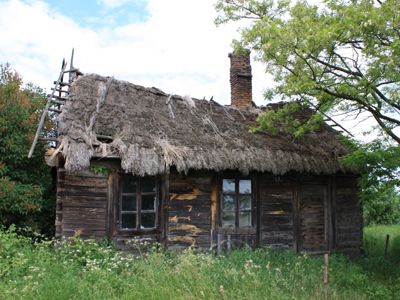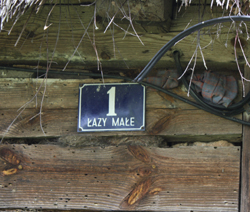After all the grammar stuff last week, I don’t know about you, but I think we‘re long overdue for something more entertaining. Yes, I know that grammar is essential when learning a new language properly, though personally, I’ve never been the kind of student who sits down and dutifully memorizes different verb endings. In whatever language. And besides, isn’t it odd that the first words we tend to master in a foreign language are normally of the not-so-nice variety?
But no, don’t worry, we won’t be discussing anything vulgar today.
One of our readers went to Poland and, by all accounts, had a great time there. He also took lots of pictures. And one of them I will share with you today.

To a Pole this is nothing special, and frankly, I doubt that anyone would give it more than a bored, passing glance. Gee, another old, crumbling house in an old, crumbling village. But to an English speaker, the name of this village, as shown on a sign on this house is unintentionally hilarious.
 Because letters such as “Ł” for example, don’t exist in English, a name like “Łazy Małe” becomes “Lazy Male”. Now, who wants to live in the house of a Lazy Male, huh? An address such as Lazy Male 1 would probably elicit more than a few chuckles in the UK.
Because letters such as “Ł” for example, don’t exist in English, a name like “Łazy Małe” becomes “Lazy Male”. Now, who wants to live in the house of a Lazy Male, huh? An address such as Lazy Male 1 would probably elicit more than a few chuckles in the UK.
Alas, in Polish Łazy Małe (it’s plural, by the way) are not so exciting. In fact, they’re not exciting at all. “Łazy” is an old Polish word for… hmm, yes, for what exactly? Oh yes, that place in the woods! You know, the place where the trees were all chopped down and the plot of land was turned into a field. That’s a “łaz” (singular). Of course since it’s an ancient word, nobody uses it anymore, and it survives exclusively for the benefit of making English people laugh.
The second word in the name – “małe” means “small” (plural, non-personal masculine).
Of course the whole name, as most Polish village names, is actually a plural noun and a plural adjective combo.
And while this noun might be archaic, the adjective is very much used these days.
- mały (singular masc.)
- mała (singular. fem.)
- małe (singular neut.)
- mali (plural, personal-masculine) notice here how “ł“ turned into “l” – that’s not a mistake, it’s supposed to be like that.
- małe (plural, others)
An audio file with all forms here.
And of course, they all mean “small”. And that’s how a “Lazy Male” becomes “Small Clearings in the Woods”. Polish can be so not fun.
photos courtesy of John (Thank you!)


Comments:
Thomas Westcott:
Anna, Would you please add sound files with the words and phrases said twice. Could you have it so that all the sound files from each article could be downloaded together? That way one could go to the next word from the media player. Please include each grammatical form as in the article above. I know that would help learning in that one could listen to the same word in its’ different forms and also practice saying those forms.
When I first read lazy male, I actually saw the l/ and read it as wazy mawe. Sorry, I do not have a Polish font. Will make do with z. , z’ , l/ , e, , a, , o’ , c’ , s’ , i n’ . Does that make sense to you?
Right now, please do not attempt to explain why l/ can become l. Let us just say that it does.
I do appreciate your grammar lessons. Bite sized. ( I know that in English “bite sized” is really not a correct sentence. I have found that in Polish many things can be understood and that what I would consider a phrase is quite acceptable as a sentence in Polish. I do have, somewhere, Elementarz and in it are expressions such as kto to. You can use this as the basis of another article.)
Anna:
Hi Thomas!
I’m sorry about the missing voice files, sometimes my computer can be a bit goofy when it comes to recording audio. I will add them as soon as I can. Also, as per your request, I will record every grammatical form.
As I understand it, you want to have all the words in one big file? Is that correct? I’m not sure, but before I try to do it, I’d like to hear from our other readers. (Personally, one big file would be easier to manage for me, too.)
And as always, thank you for your very constructive comments, they will help me make this blog better and better! 🙂
Thomas Westcott:
YES Anna. If all the words and phrases from each article can be downloaded together then one could read or, as in my case, reread the article with the media player going at the same time. Since the media player is in a separate window and can be manipulated independently from the article then I could advance easily to the next word or phrase as I read the article. For me, this ( to, ta, albo ten? ) allow me to better match the sounds with the spelling; And I think that would be a great aid to learning.
Also, as another article idea – could you please cover ‘that’? I am not sure how to explain the difference between this and that.
I do know that ‘that’ is used quite extensively in English.
Andre:
I have “lazy” students in my class from time to time. hehehe
Anna:
Hi Andre!
Is it THAT bad? Or actually “that good” – if you have them only from time to time. 😉
Anna:
Hi Thomas,
I have made some changes to how the voice files are arranged, only for the most recent posts for now. Hopefully, we can find a way to satisfy all readers!